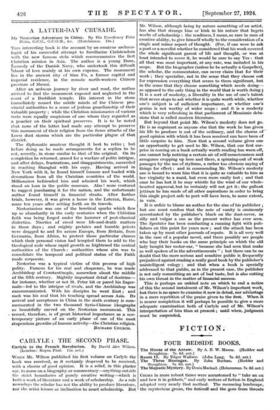CARLYLE : THE SECOND PHASE.
Carlyle to the French Revolution. By David Alec Wilson. (London: Kogan Paul. 15s. net.) WHEN Mr. Wilson published his first volume on Carlyle the book was received, as. it certainly deserved to be received,
with a chorus of good opinion. It is a relief, in this plaster age, to come one biography or commentary—anything outside the strict boundaries of purely creative writing—which is both a work of literature and a work of scholarship. As a rule nowadays the scholar has not the ability to produce literature, nor the artist leisure or inclination to court scholarship. But Mr. Wilson, although being by nature something of an artist, has also that strange bias or kink in his nature that begets works of scholarship : the readiness, I mean, so rare in men of creative ability, to give himself wholly to the consideration of a single and minor aspect of thought. (For, if one were to ask a poet or a novelist whether he considered that his work covered the whole significant gamut of life and thought, or was at least intended to cover it, he would be sure to say Yes : that all that was most important, at any rate, was included in his scope. But the biographer (unless he be actually a Gospeller), the scholar, the commentator, can never claim that for their work ; they specialize, not in the sense that they choose out for expression everything that seems to them significant, but in the sense that they choose something which needs doing— as opposed to the only thing in the world that is worth doing.) It is a sort of modesty, a liberality in the use of one's talent that never stops to ask whether it is quite worthwhile, whether one's subject is of sufficient importance, or whether one's genius is not worthy of wider scope : and it is a modesty which is very refreshing in that parliament of Messianic delu- sions that is called modern literature.
But beyond that point Mr. Wilson's modesty does not go. He is as cognizant as anyone else that the work he has given his life to produce is out of the ordinary, and the chorus of good opinion with which it has been received can have been of little surprise to him. Now that a second volume gives one an opportunity to get used to Mr. Wilson, that our first sur- prise in coming on a book actually worth reading has worn off, one cannot help noticing a certain air of self-consciousness and arrogance cropping up here and there, a spinning-out of weak passages by the use of stylisms, a rather too obvious saying of things for effect : and in commending Mr. Wilson's modesty one is bound to warn him that it is quite as valuable to him as her virginity to a maid, but even more easily lost ; and that once he has lost it he may whistle for the wind of our whole- hearted approval, but he certainly will not get it ; the gallant jettison, he has made of all other aspirations in order to bring this single project safe to port will have been, to some extent, in vain.
It is unfair to blame an author for the sins of his publisher ; but one must confess that the note of vanity is ominously accentuated by the publisher's blurb on the dust-cover, as silly and vulgar a one as the present writer has ever seen. The Spectator has been conducting a running fight with pub- lishers on this point for years now ; and the attack has been taken up by most other journals of repute. It is all very well in the case of a popular novel, and there possibly are people who buy their books on the same principle on which the old lady bought her motor-car, " because she had seen that make so well spoken of in the advertisements " ; but there can be no doubt that the more serious and sensitive public is frequently prejudiced against reading a really good book by the publisher's unintelligent eulogy ; and that when a book is specially addressed to that public, as in the present ca.se, the publisher is not only committing an act of bad taste, but is also cutting his own throat in the matter of financial success.
This is perhaps an unkind note on which to end a notice of this the second instahnent of Mr. Wilson's important work, but there is no space to examine it now in detail, nor adVanta,ge in a mere repetition of the praise given to the first. When it is nearer completion it will perhaps be possible to give a more adequate examination both of Carlyle and of Mr. Wilson's interpretation of him than at present '; until when, judgment must be suspended.






































 Previous page
Previous page